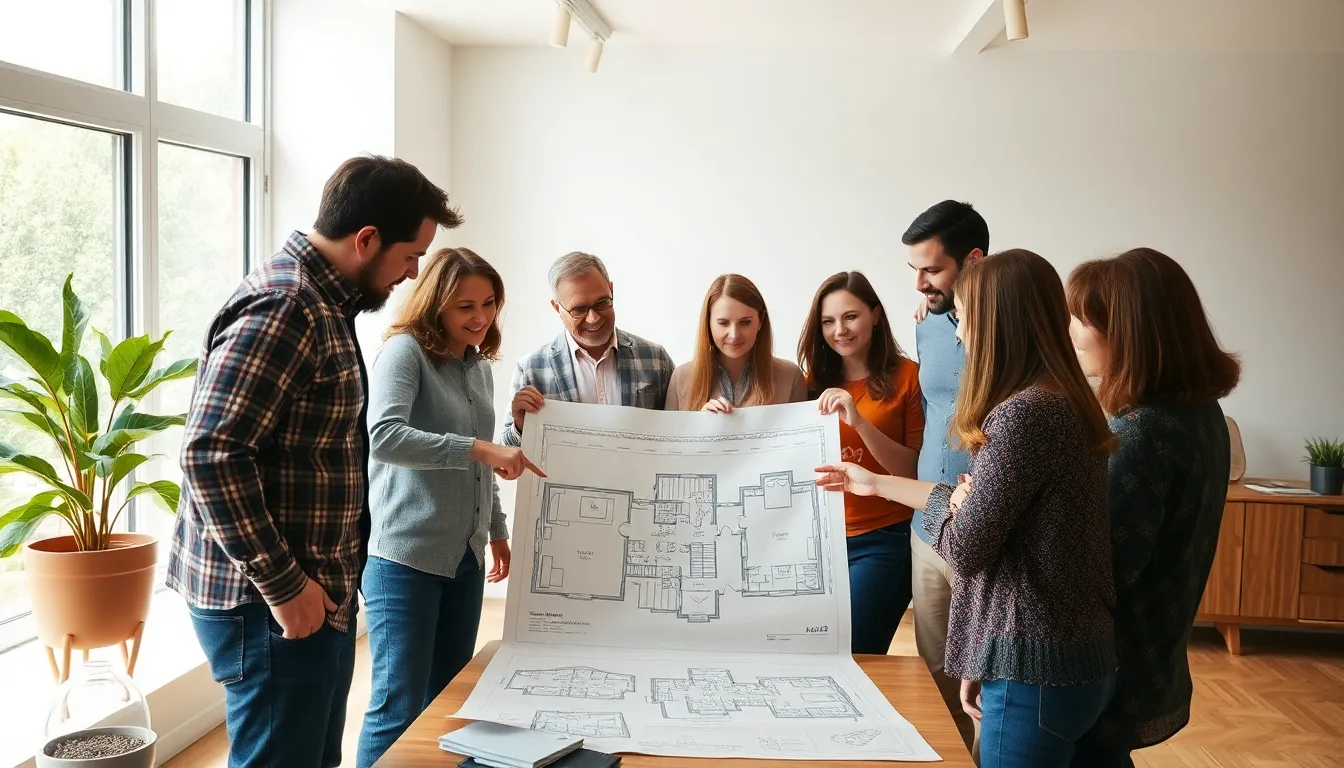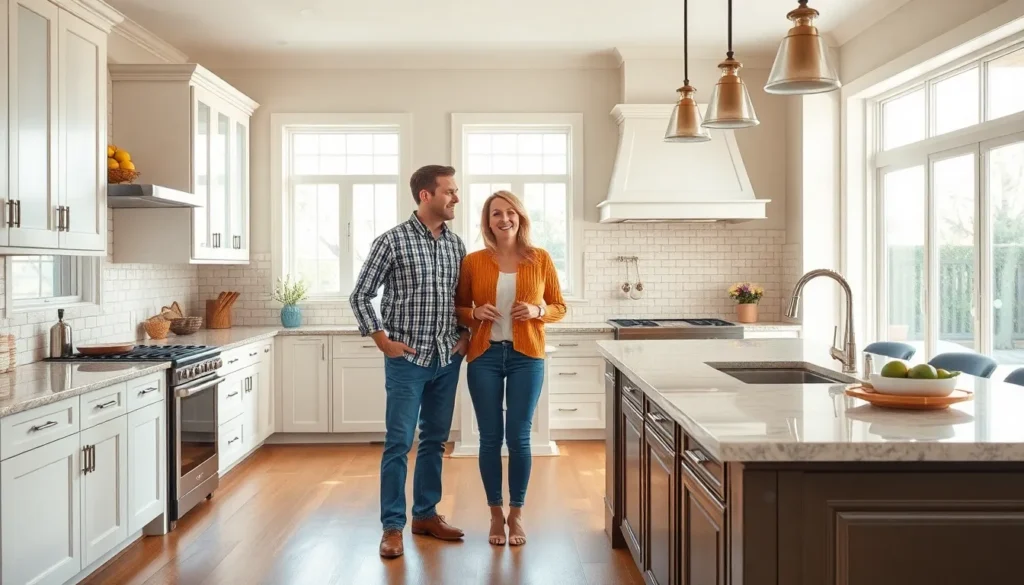Imagine walking into a home that feels like it was plucked straight from your dreams. Custom home design makes that fantasy a reality, transforming blank spaces into personalized havens. It’s not just about walls and roofs; it’s about crafting a lifestyle that reflects individuality and flair.
Table of Contents
ToggleWhat Is Custom Home Design?
Custom home design refers to the personalized approach in creating residential spaces tailored to individual preferences. This method transforms specific ideas into functional living areas that reflect one’s lifestyle and aesthetic tastes. Homeowners collaborate with architects and designers to determine layouts, materials, features, and overall styles. Engaging in this process allows for a one-of-a-kind property that stands apart from traditional builds.
Personalization is a key component in custom home design. Each decision made during the process can cater to functionality, comfort, or beauty. For instance, homeowners can choose unique characteristics such as open floor plans, large kitchen islands, or luxurious master suites. Many opt for energy-efficient features, integrating sustainable materials and appliances to minimize environmental impact.
Flexibility also plays a critical role in custom home design. Adjusting layouts, sizes, and room functions can achieve harmonious living environments. Designers can easily modify plans to address specific family needs, such as extra bedrooms or home offices. As a result, unique solutions emerge to accommodate varying lifestyles.
Overall, custom home design empowers homeowners to create spaces tailored to their vision. The interplay of creativity, practicality, and individuality results in homes that are not only functional but also deeply personal. This focused attention leads to an end product that truly represents the homeowner’s ideals.
Benefits of Custom Home Design

Custom home design offers significant advantages, providing homeowners with tailored residences that reflect personal style and functionality. This approach results in unique spaces that adapt to individual needs.
Personalization and Flexibility
Personalization stands central to custom home design. Homeowners select every detail, from layouts to materials, ensuring each element aligns with their vision. Flexibility enhances this process, enabling easy adjustments to floor plans and room functions based on changing family dynamics or preferences. Designers create spaces that respond to various lifestyles, whether nurturing a growing family or accommodating remote work needs. Individual choices contribute to comfort and satisfaction, making it possible to incorporate personal touches in every corner.
Energy Efficiency
Energy efficiency emerges as a crucial benefit in custom home design. Homeowners can integrate advanced technologies and sustainable materials that reduce energy consumption. Customized energy-efficient features, such as solar panels and high-quality insulation, enhance long-term savings and ecological impact. Building orientation and window placement also play vital roles in maximizing natural light while reducing reliance on artificial lighting. Such design decisions not only foster a green living environment but also provide cost-effective solutions that align with modern values.
Key Elements of Custom Home Design
Custom home design revolves around essential aspects that create unique spaces tailored to individual needs. Homeowners find great value in understanding these components.
Layout and Flow
Architects prioritize layout and flow in custom homes. Open concepts often enhance the interaction between spaces, creating a sense of connectivity. Additionally, layouts must reflect the household’s lifestyle, optimizing areas for daily activities. Traffic patterns in the home receive careful consideration, allowing for easy movement between rooms. Spaces like kitchens and living rooms often benefit from strategic placements for social gatherings. Flexibility in design allows homeowners to adapt layouts over time, accommodating changing needs seamlessly.
Material Selection
Choosing materials stands as a crucial element in custom home design. Homeowners often opt for high-quality, durable options that enhance aesthetics and functionality. Materials like hardwood flooring, stone countertops, and eco-friendly insulation draw interest for their longevity and appearance. Designers recommend sustainable choices to align with energy-efficient goals, promoting an environmentally conscious lifestyle. Customization extends to finishes, colors, and textures, enabling a personal touch that reflects individual preferences. Careful selection leads to a harmonious balance of style and practicality throughout the home.
Choosing the Right Designer
Selecting a designer significantly influences custom home design outcomes. The right professional ensures a seamless integration of personal style and functional needs.
Evaluating Experience
Experience plays a crucial role in choosing a designer. Look for professionals who have completed diverse projects similar to the desired custom home. Review portfolios to assess their design style and versatility. Established designers often come with industry knowledge, helping navigate challenges effectively. Check client testimonials to gauge satisfaction levels and reliability. Assessing credentials, such as licenses and certifications, also provides insight into their competence. A well-rounded designer has a history of successful collaborations that reflect their ability to understand client needs.
Importance of Communication
Effective communication cannot be overstated when selecting a designer. Clarity ensures that ideas translate into reality, minimizing misunderstandings. Discussing preferences and requirements openly fosters a collaborative environment. Designers should listen attentively, providing thoughtful feedback and suggestions. Regular updates on progress help maintain alignment with client expectations. The ability to articulate concepts clearly enhances the design process. Establishing a comfortable rapport also encourages honest dialogue, making it easier to address changes or concerns. Prioritizing communication leads to a smoother, more fulfilling custom home design experience.
Current Trends in Custom Home Design
Custom home design trends increasingly focus on sustainable practices and innovative technology. Homeowners now prioritize environmental considerations and functional enhancements in their residences.
Sustainable Materials
Sustainable materials gain prominence in custom home design. Many homeowners opt for reclaimed wood and bamboo, both renewable resources that offer durability. They appreciate recycled steel and low-VOC paints, which minimize environmental impact. Additionally, energy-efficient appliances often accompany these materials, enhancing overall sustainability. Working with designers familiar with green certifications ensures that specific sustainability goals are met.
Smart Home Technology
Smart home technology plays a crucial role in modern custom homes. Homeowners frequently choose integrated systems like smart thermostats, security cameras, and lighting controls. These smart features enhance convenience and energy efficiency, allowing for remote access and monitoring. Builders now incorporate pre-wiring solutions during construction, simplifying future technology upgrades. Partnerships with technology experts further enable seamless integration of the latest smart devices, creating truly innovative living environments.
Custom home design offers a unique opportunity for homeowners to create spaces that truly reflect their individuality and lifestyle. By collaborating with skilled architects and designers, they can ensure every detail aligns with their vision.
The emphasis on personalization and flexibility not only enhances comfort but also promotes energy efficiency through sustainable choices. As trends evolve towards eco-friendly materials and smart technology, custom homes are becoming more than just living spaces; they’re a testament to modern living.
Ultimately, the journey of custom home design is about crafting a sanctuary that meets the specific needs of each family, making it a worthwhile investment for those looking to build their dream home.





